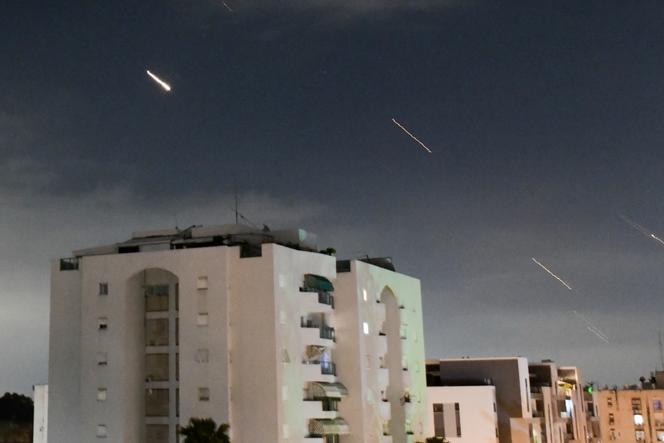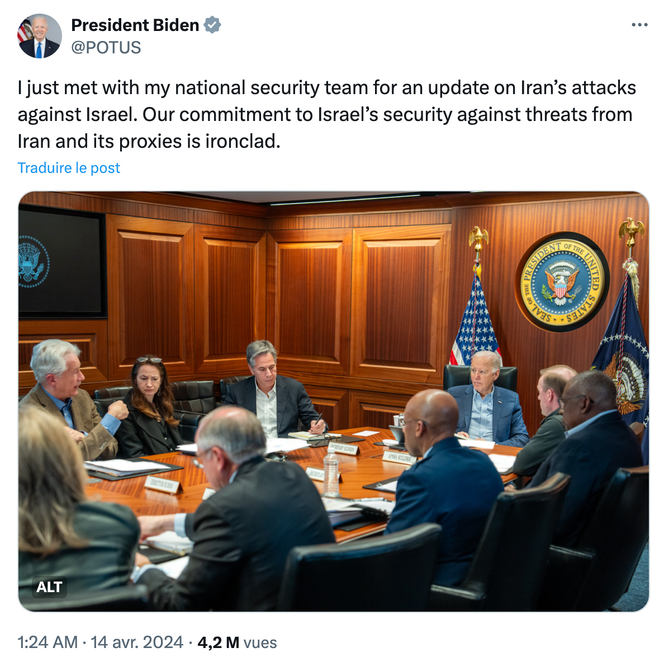


The UN Security Council will hold an emergency meeting on Sunday, April 14, over Iran's unprecedented drone and missile attack on Israel, the body's president said. A spokesperson for Malta, which holds the rotating presidency this month, told the press Saturday evening that the Security Council was aiming for the meeting to be held at 4:00 pm (2000 GMT) the following day, at Israel's request.
Israel's envoy to the UN, in a letter to the Security Council president, called Iran's air assault a "flagrant violation of Israel's sovereignty." "Today, Iran has launched a direct attack from within its territory of more than 200 (drones), cruise missiles and ballistic missiles towards Israel," Israeli ambassador Gilad Erdan wrote.
Earlier, United Nations Secretary-General António Guterres was calling for an immediate halt to hostilities in the Middle East. "I strongly condemn the serious escalation represented by the large-scale attack launched on Israel by the Islamic Republic of Iran this evening," Guterres wrote in a statement Saturday night. "I am deeply alarmed about the very real danger of a devastating region-wide escalation. I urge all parties to exercise maximum restraint to avoid any action that could lead to major military confrontations on multiple fronts in the Middle East," Guterres wrote. "I have repeatedly stressed that neither the region nor the world can afford another war."
United States President Joe Biden promised "ironclad" support for Israel after holding an urgent meeting with top security officials. "I just met with my national security team for an update on Iran's attacks against Israel. Our commitment to Israel's security against threats from Iran and its proxies is ironclad," Biden said on X, posting a picture of the meeting in the White House Situation Room.

US officials say American military forces have downed some Iran-launched attack drones flying toward Israel. That is according to a US defense official and two US officials who spoke on the condition of anonymity to discuss the matter. The defense official said the effort to intercept the attack was continuing.
General Erik Kurilla, the head of the US military's Central Command, was in Israel over the weekend consulting with Israeli defense officials. The Central Command oversees US forces in the Middle East.
Likewise, Canadian Prime Minister Justin Trudeau said his nation "unequivocally condemns Iran's airborne attacks against Israel." "We stand with Israel. After supporting Hamas' brutal October 7 attack, the Iranian regime's latest actions will further destabilize the region and make lasting peace more difficult," Trudeau said in a statement. "We support Israel's right to defend itself and its people from these attacks."
Iran's mission to the United Nations issued a warning to both Israel and the US "Should the Israeli regime make another mistake, Iran's response will be considerably more severe," it wrote online. "It is a conflict between Iran and the rogue Israeli regime, from which the US MUST STAY AWAY!"
In Egypt, Cairo's foreign ministry expressed its "deep concern" at the escalation of hostilities and called for "maximum restraint". The ministry's statement also warned of the "risk of the regional expansion of the conflict", and added that Egypt would be "in direct contact with all parties to the conflict to try and contain the situation".
The Saudi foreign ministry issued a statement voicing its concern at the "military escalation" and calling on "all parties to exercise utmost restraint and spare the region and its peoples from the dangers of war". It went on to urge the UN Security Council "to assume its responsibility towards maintaining international peace and security".
The European Union's foreign affairs chief Josep Borrell condemned the strikes as "an unprecedented escalation and a grave threat to regional security" in a message on X.
The French government forcefully condemned the Iranian air attack on Israel. French foreign minister Stéphane Séjourné said in a statement Saturday that in "taking such an unprecedented action, Iran has crossed a new threshold with regard to its destabilizing activities and is risking a potential military escalation."
La France condamne avec la plus grande fermeté l’attaque déclenchée par l’Iran contre Israël.
— Stéphane Séjourné (@steph_sejourne) April 13, 2024
En décidant d’une telle action sans précédent, l’Iran franchit un nouveau pallier dans ses actions de déstabilisation et prend le risque d’une escalade militaire.
1/2
German Foreign Minister Annalena Baerbock wrote early Sunday on X that Germany condemns "in the strongest possible terms the ongoing attack, which could plunge an entire region into chaos. "Iran and its proxies must stop it immediately," Baerbock wrote. "We offer Israel our full solidarity at this time."
United Kingdom Prime Minister Rishi Sunak condemned the "reckless" strikes, which he said "risk inflaming tensions and destabilizing the region. Iran has once again demonstrated that it is intent on sowing chaos in its own backyard."
UK Defense Secretary Grant Shapps said additional Royal Air Force jets and air refueling tankers have been sent to the Middle East to bolster Britain's existing operation against the Islamic State Group in Iraq and Syria. He said the jets "will intercept airborne attacks within range of our existing missions," but did not confirm whether RAF jets had already shot down any Iranian drones.
Italy's Foreign Minister Antonio Tajani said his country was following the situation "with attention and concern" and was "ready to manage any kind of scenario".
Meanwhile, the spokesperson of Argentine President Javier Milei says the leader will cancel a trip to Denmark and return to Buenos Aires due to Iran's attack on Israel. A statement from presidential spokesperson Manuel Adorni said Milei was flying home to form a "crisis committee in light of the latest events in Israel, to take charge of the situation and coordinate actions with the presidents of the Western world."
Mexico's government said it "condemns the use of force in international relations and calls on the parties to use self-restraint and seek solutions peacefully" to avoid a wider regional conflict.
